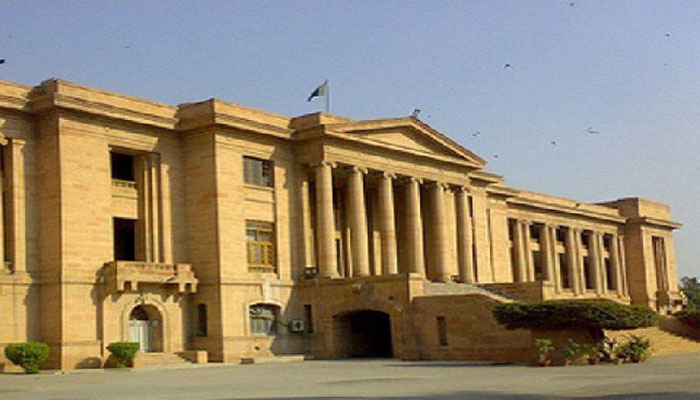SHC takes exception to govt’s failure to enforce SICVD Act
The Sindh High Court (SHC) has taken exception to the Sindh government’s failure to implement the Sindh Institute of Cardiovascular Diseases (SICVD)Act, observing that except Tando Mohammad Khan and Sukkur, no other units of the institute were providing facilities required by the law.
Hearing a petition with regard to affairs of the National Institute of Cardiovascular Diseases (NICVD) and other tertiary care hospitals in the province, a division bench of the SHC comprising Justice Salahuddin Panhwar and Justice Adnanul Karim Memon observed that record reflected that the SICVD Act was enacted on papers only and no true effort had been made to achieve its objectives.
The high court observed that several hospitals and units in different districts of the province including Karachi were deemed to be branches and integral parts of the SICVD but surprisingly except for its units in Tando Muhammad Khan and Sukkur, other units were not providing the required facilities for cardiovascular diseases.
The SHC directed the health secretary to submit an explanation in this regard to be placed on next date of hearing.
Regarding holding of additional charges of SICVD units by the NICVD executive director, the high court observed that the SICVD board was working under the health minister, whereas, the NICVD board was working under the chief minister.
The bench observed that it was strange that despite the SICVD Act 2019 wherein different institutes/units had been established and working, their management was with the NICVD. To a court query, the health secretary submitted that he was a member of both the NICVD and SICVD boards and he would discuss the issue with the authorities and ensure that within three months, new administrator and managers were appointed.
Regarding the status of other tertiary care hospitals in the province, the Civil Hospital Hyderabad medical superintendent (MS) submitted that the hospital was affiliated with the Liaquat Medical University and comprised 1,700 beds with two units in Jamshoro and Hyderabad.
He submitted that since its inception, they had not carried out any bypass surgery and their cardio wards were like chest pain assessment units that may be considered as referral wards.
The MS submitted that he had tried to persuade the university to provide a surgeon to run the cardio ward of the hospital. The high court was informed that the budget of the hospital was Rs5.3 billion.
The Larkana tertiary care hospital MS submitted that the health facility comprised 1,600 beds with the budget of Rs1.38 billion but they had no facility of cardiac treatment in the hospital.
The MSs of the Nawabshah, Khairpur and Sukkur tertiary care hospitals submitted that cardio facilities were being provided there and different procedures were available.
The Civil Hospital Karachi MS submitted that the hospital had 1,932 beds and it had the yearly budget of Rs5.7 billion. He informed the bench that the hospital offered major cardiac surgeries.
The high court was informed that the Sindh government had introduced the Tertiary Hospitals Management Board Act and currently, the boards of the tertiary hospitals were working under the vice chancellors or principals of the relevant universities.
After taking the comments on record, the SHC observed that it was expected that the provincial government shall take initiatives to ensure basic health facilities for every citizen and tertiary hospitals and civil hospitals shall no more be referral hospitals in the future.
The high court observed that it had come on record that different hospitals had been functioning under the private-public partnership and basic units were outsourced.
The health secretary submitted that the department was going to propose an additional allowance for doctors having skill in different fields, particularly in major diseases.
-
 Threads Launches Dear Algo AI Feature To Personalise Feeds In Real Time
Threads Launches Dear Algo AI Feature To Personalise Feeds In Real Time -
 Police Take Action Over Andrew's Ties With Jeffrey Epstein While In UK Office
Police Take Action Over Andrew's Ties With Jeffrey Epstein While In UK Office -
 Courtney Love Makes First Appearance Since New Report On Kurt Cobain's Death
Courtney Love Makes First Appearance Since New Report On Kurt Cobain's Death -
 King Charles Anxious As Uncertainty Grows Over Sarah Ferguson’s Next Move
King Charles Anxious As Uncertainty Grows Over Sarah Ferguson’s Next Move -
 Real Reason Kim Kardashian Is Dating Lewis Hamilton
Real Reason Kim Kardashian Is Dating Lewis Hamilton -
 Rihanna Leaves Elderly Woman Star-struck In Viral Grocery Store Video
Rihanna Leaves Elderly Woman Star-struck In Viral Grocery Store Video -
 TikTok US Launches Local Feed Using Precise Location Data
TikTok US Launches Local Feed Using Precise Location Data -
 Jill Biden’s Former Husband Charged With Wife’s Murder
Jill Biden’s Former Husband Charged With Wife’s Murder -
 Zayn Malik Reveals Parenting Decision Gigi Hadid Criticized Him Over
Zayn Malik Reveals Parenting Decision Gigi Hadid Criticized Him Over -
 Palace Releases Prince William's Photos From Final Day Of His Saudi Arabia Visit
Palace Releases Prince William's Photos From Final Day Of His Saudi Arabia Visit -
 Microsoft Warns Of AI Double Agents As Enterprise Adoption Of AI Agents Surges
Microsoft Warns Of AI Double Agents As Enterprise Adoption Of AI Agents Surges -
 Kate Middleton, Prince William Break Silence Over Tragic Shooting In Canada
Kate Middleton, Prince William Break Silence Over Tragic Shooting In Canada -
 'Finding Her Edge' Star Madelyn Keys Explains Adriana's Remarks About Brayden Romance
'Finding Her Edge' Star Madelyn Keys Explains Adriana's Remarks About Brayden Romance -
 Royal Expert Raises Questions Over Sarah Ferguson's 'plotting' Stunning Comeback
Royal Expert Raises Questions Over Sarah Ferguson's 'plotting' Stunning Comeback -
 Instagram Develops AI ‘Create My Likeness’ Tool To Generate Personalised Photos And Videos
Instagram Develops AI ‘Create My Likeness’ Tool To Generate Personalised Photos And Videos -
 Meghan Markle, Prince Harry Friends Suggest Their Marriage 'isn't All It Seems'
Meghan Markle, Prince Harry Friends Suggest Their Marriage 'isn't All It Seems'




